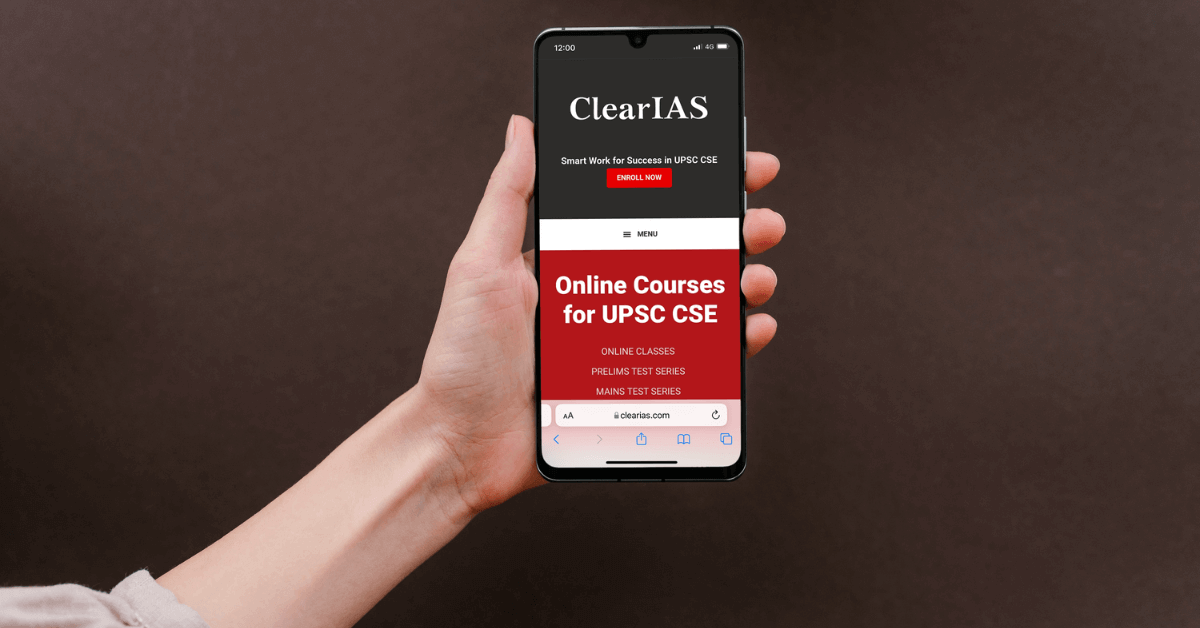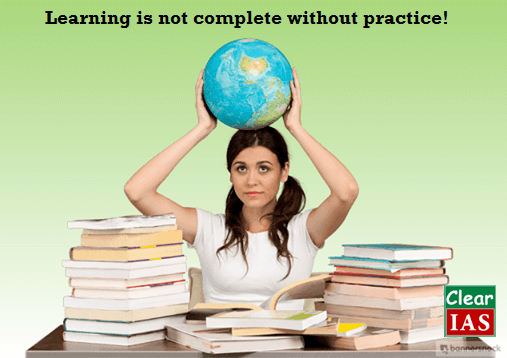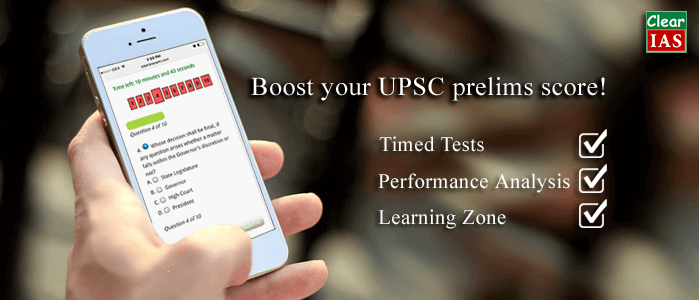
Almost everybody these days talks about smart work.
But what exactly is smart work? How is smart work different from hard work?
This article is written with a special focus on doing smart work for IAS preparation.
Hard work vs Smart Work
In school days, we must have come across both hard workers and smart workers.
Hard workers would study the entire year, make notes on almost everything, and prepare hard for examinations. However, when the final results come, some ‘dark horses’ emerge to top the list, often overtaking the hard workers, surprising everybody.
Yes, they are smart workers.
The smart worker completes the most important tasks first. They prioritise their actions. If the effort is not worth the return, they may even don’t do it.
In contrast, hard workers try hard and attempt to learn almost everything. In the process, they tend to devote more time to unimportant topics and materials, resulting in the loss of valuable time.
Smart workers would pay more attention to their final goal and clear the examinations in flying colours spending less time, energy and money!
The effort is important, but knowing where to make an effort makes all the difference.
ClearIAS is a learning platform that gives special emphasis to smart work in almost everything we do.
We believe success in the UPSC Civil Services Examination is 50% Knowledge and 50% Skills.
From that perspective, when the traditional coaching institutes focus entirely on Knowledge, ClearIAS gives equal stress to Exam Skills and Life Skills as well.
This is reflected in our flagship programs like
Many techniques like Intelligent Elimination Techniques, Question Paper Solving Techniques, Memory Techniques etc are covered in the above-mentioned online programs. These are part of the ClearIAS Smart Work Approach for Success in UPSC CSE.
Smart Work is all about achieving more with minimum effort
Smart work is all about Return on Investment (ROI).
It is about maximum gains with minimum effort.
To get maximum gains with minimum effort, the effort has to be highly focused and specific in some areas.
Core Resources vs Supplementary Resources
There is a management principle that is to be remembered here. It is called Pareto’s Rule or the 80:20 principle.
The 80:20 rule states that there are 20% items that will bring 80% results. The other 80% can bring only 20% results.
In that perspective, in our opinion, the 3 action items that can bring maximum results in minimum time are:
These 3 programs of ClearIAS are unmatched in their quality and exam focus. They are part of the initial 20% effort which can bring huge returns.
ClearIAS strongly recommends all aspirants who wish to crack UPSC CSE faster to enroll in the ClearIAS Online Classroom Program (PCM or PMB) and practice at least 10000 MCQs we provide as part of the ClearIAS Prelims Test Series, UPSC CSE Re-Takes and ClearIAS Ebooks.
Trust us. It won’t take as much time as you think. Learning from the expert faculties of ClearIAS and practising online mock exams of ClearIAS are two highly efficient strategies to boost your marks in minimum time.
Also read: Tips on UPSC Preparation for Working Professionals
Know what to study and what not
There is no shortage of books, materials, or coaching in the market, but there is no proper guidance regarding what to study and whatnot.
The root concept of smart work for clearing the IAS exam lies in the same – knowing what to study and whatnot.
Utopian Model of Civil Services Preparation:

If you are thinking that you need to read N number of books (the big ones you know, with the size of a pillow where N is a variable which starts only from the smallest possible 3-digit number), attend the IAS classroom coaching at ABC institute, BCD institute, and XYZ institute for specialized classes for each subject, browse 15-20 websites and prepare notes from 5-10 newspapers and magazines each day to clear IAS, you are probably wrong.
The exaggerated actions highlighted above are Utopian cases, which are neither practical nor necessary to clear the Civil Services Exam. Even if an imaginary person does all that is stated above, there is still a chance that he may not succeed in UPSC Prelims/Mains.
What matters in the UPSC Exams is the Quality of Learning and not the Quantity!
What matters in UPSC IAS preparation is not the quantity (volume) of materials one has gone through, but the quality of learning and revision done.
Equally important as knowledge (or conceptual understanding) is another factor – Skill.
To clear an exam like UPSC CSE, you need to develop your exam skills.
Aspirants should also develop personalized strategies knowing their strengths and weaknesses, as general strategies might not work in individual cases.
Techniques to boost your UPSC Marks within a short time!
ClearIAS has developed various techniques to clear the IAS exam with ease. Some of them:
‘Collector’ or ‘Book Collector’?
As books in physical form are an indispensable prerequisite for IAS preparation, candidates should not worry about spending a few bucks on the necessary books for UPSC exams.
In fact, from the very beginning aspirants should keep aside a sum of around Rs. 5000-10,000 entirely for basic books, magazines and newspapers.
But what are the essential books for IAS preparation? Don’t worry. We are coming to that.
Also read: A Note Before You Begin IAS Preparation or Coaching
Book-Buying Habit of Aspirants – Two Extreme Cases
Two versions of candidates can be observed if we keenly analyze the book-buying habits of aspirants.
The first group are extremely reluctant to spend on books, though they are happy to spend lakhs of rupees on coaching classes (without any use), drinks, the latest gadgets or parties.
However, instead of the original books, they depend on pirated PDFs, photocopies, and the coaching class notes.
The second version of aspirants considers being a book collector as the prerequisite for becoming an actual collector. Rooms of these guys can at any time beat any central library in terms of quantity of materials 🙂
Choose the middle path!
We at ClearIAS.com suggest a middle path. Though books are lifelong assets and the money spent on books can be seen as an investment, you should also consider the time factor. You have only limited time and UPSC does not expect you to read all the textbooks and magazines available on the market.
So candidates are advised to adopt a basic minimum program in the case of books and study materials that should be bought. Depending upon the time available and your knowledge level, you may expand your book base from this basic minimum.
We have listed 15-20 books recommended by toppers (considering the requirements of Prelims, Mains, and Interview). Once you begin, you may not buy all of them together. Start with 1-2 books for each subject. However, get NCERT textbooks for all subjects from classes 6-12.
Even the minimum book list (listed below) might look exhaustive for some of the aspirants, but unfortunately, we can’t help that. The one-year-long UPSC exam cycle expects you to go through at least these basics. After all, you are doing smart work for the IAS exam, and not any school exams! 🙂
Also read: 10 Tips for Students to Prepare for IAS Exam while in College
Smart Work for IAS Preparation: The strategy, books and study materials

1. Download the ClearIAS app for overall guidance
ClearIAS™ was started with a vision of quality, but affordable online education, giving stress to self-study. ClearIAS has released free mobile apps as a complete smart-study package for free. Our Android apps have already crossed 10,00,000+ downloads.
2. Follow ClearIAS ‘Prelims cum Mains Integrated Approach’
Prelims and Mains, though two separate stages of the UPSC Civil Services Exam, are not water-tight compartments. Many of the topics included in the Main Exam are mentioned in the Prelims syllabus too.
You need to devote time for Prelims and Mains together while preparing. Read our article on how to prioritise your time and topics, as part of our Prelims cum Mains Integrated Approach.
3. Buy the recommended books for IAS preparation
Don’t forget to get copies of NCERT books from classes 6-12. A detailed list of useful books needed for IAS preparation is available on ClearIAS.com.
4. Enroll for ClearIAS Prelims Mock Test Series
As you may know, only when tested in an exam atmosphere with negative marking, you can improve your ability to deliver in the actual exam hall.
Try for free the UPSC Prelims online mock exams by ClearIAS in the new innovative platform which integrates learning with test-taking.
We strongly recommend all serious aspirants to join our flagship program – ClearIAS Prelims Online Mock Test Series.
You would be surprised to find how fast you can learn.
5. Write ClearIAS Mains Mock Tests
Proper answer writing practice, a good understanding of the latest UPSC syllabus, and familiarity with current topics are important prerequisites for clearing IAS mains in flying colours.
It is with this aim of equipping aspirants with the latest requirements of the UPSC mains exam we launched our UPSC Mains Test Series.
6. Keep in mind the important tips for the IAS interview:
IAS interview is a half-an-hour exercise that can change your life.
A high score in a UPSC interview can sometimes create a difference of more than 100 marks with fellow candidates in just under 30 minutes.
Read our UPSC interview tips.
What not to Study for IAS?

As we have covered the minimum materials (under the basic minimum program!) one should study for clearing IAS, let us cover another most important area – What not to Study for Clearing IAS. You should never spend much time on the areas listed below. ( These details are never worth the time of a serious UPSC aspirant!)
- Bollywood and all the other “filmwoods”- Don’t spend time remembering the pet names of actresses, music director’s uncles’ names, gossip, latest flops and masala stories.
- Sports – Don’t spend time remembering all the centuries of Sachin, sixes hit by Gayle, IPL purple caps etc. Remember that you are going to write the UPSC exam and not any Crorepathi shows on Television. However, keep a note about the important events (Olympics, World Cup, Top Players etc).
- Politics – Neglect the entire local/state political news. Just brief through central politics news, but there is no need to mug up the details of stories.
- Names of Uganda’s President, Currency in Kiribati etc unless these make headlines during the year.
If you are a beginner (or veteran) who is confused about the right strategies, we strongly recommend you start with the ClearIAS beginner’s guide.
You can also download our ebook (PDF) – “UPSC Civil Services Exam – The Beginner’s Guide to Success”.
You may also check the article Strategy and Books for Early Birds To Clear IAS Exam if ‘civils’ is a long-term plan.
Smart Work for IAS Preparation: Conclusion
The importance of smart work is at a time when there is a wide variety of resources available around every aspirant to make him/her.
Most aspirants don’t prepare in an efficient manner resulting in the wastage of valuable youth years.
To save time, effort, and money you need to prioritise your actions.
We recommend the 3 action items listed above ie ClearIAS Online Classes, ClearIAS Online Mock Exams, and UPSC CSE Re-Take Exams to be part of the Core Resources.
Online learning should be clubbed with the practice of mock exams.
If you can find the perfect balance with online classes, online exams, online study materials, and textbooks – you can clear UPSC exams with minimum time, effort and expense.
Always remember the 80-20 principle!
Even if you were a hard worker before, if you can adopt at least some strategies of a smart worker, you can significantly improve your marks.
Make sure that your preparation is aligned with the UPSC syllabus and previous question papers.
Hard work without focus might not help you, but smart work in the direction required by UPSC surely will!








Interesting.
WoW
very nice tratise on ias aspirant like me
really it clear many doubts and now i an going with full swing
991324829
Brilliant and excellent guidelines.. thanks and g8 work..
Awsm
Perfect Guidelines., Thank you my e-Guru.
sir I want to prepare for IAS but problem is that i am from Hindi medium.. will you provide notes/books for Hindi medium student..???
i want to appear for next year prelims exam so please do help me from where i should start my preparation ???? i m complete depressed after watching so many book & please provide me the best selected books through which i should approach the Exam .
Thank u
hey man same here if u figured some out then contact me too,, on my email id – [email protected] , totally confused where to start from and i little afaired of these things
Way of approaching is very nice
Thank you.
Thanks for guidence ..
Good push for beginners…..tq
thanks. I needed the right dosage. Thanks for it.
Thumbs Up!
Really smart
very nice and really smart work.keep it up.we are thanx to u
These details help me a lot.
Thanks……
i am a student of BA final, with subject political science and i want to prepare for civil services, please tell me where to start from?
also i am a hindi medium student, so suggest me books in hindi as well
Well very nice job keep going ….more updates more knowledge
Really very nice
Thank you
It provides confidence n really inspires to study…
thanks alot…
ur efforts will be counted in students success….
its excellent but give more chances …..for attending free mock tests…..as it is stated that it is free
Thank you
I m a working professional. Please suggest me the guidelines for study.
Give me properly guidance
Superb
I think this is enough to a person who is struggling for IAS exam,this is good to me. Thank you.
First of all I wanna say thank you to clearIAS.
its really Superb guidance program for every students including me.
All the very best for every students hope every one should take greater advantage of this greater program.
@Aishwarya: Appreciate the positive feedback. All the best!
thanks a lot clearIAS to suggest what to do and what not to do……..very helfull guideline for beginner like me…….
Please tell me about ias exam
preparation
Sir I have just clear my 12th class exam and now I want to go for ba Llb but I also want to start IAS preparation what I have to do
I am completed my graduation as Bsc Electronics.please help me to improve English and preparation tips and to select the optional subject.
Sir, is there scalling in optional paper 6 ,7 ???
Sir. I want to be a IAS. But my graduation in ycmou BA so any problem in feature. Please tell me sir
Guide lines for the beginners of UPSC is very clear cut .
Thank u for the great work
Sir give me strategies because I am want to be an IAs. I don’t have any idea about study material.
Clearias yours information and guidance is seems very usefule for ias preparation but still i am confused. I do not start preparation yet. Please guidr me with best books and all material which required to clear ias exam prelims as well as mains. I really need it. Please mail me on my email id [email protected]. please mail all books name which enough for ias prelims and mains. Please help me.
thanks for guidance
After read the smart work information in above ,I have an clear idea what should read first. And then what should read,the person who is going to start for upsc preparation .first,red the NCERT books along with daily current affairs and the go for the upsc preferred books .so,my dear friends think about the smart work and start the Preparation .
Thank u!
Sir, will u please tell me how to make notes from Hindu newspaper
no matter what world says this site is really perfect for CS preparation….i hope one day i will give credit to this site … for my success… thanks
Dear Sir ,
I am presently working as a Navigating Officer in Merchant Navy , I have Completed Bsc. ( Nautical Science ) .
Please guide me how to prepare for UPSC EXAM on ship as I sail for 6 months , what study material should I Follow.
Also suggest which optional subjects should I Choose .
Awaiting a Positive reply from your end .
Thanking You,
Dear Sir ,
I am presently working as a Navigating Officer in Merchant Navy , I have Completed Bsc. ( Nautical Science ) .
Please guide me how to prepare for UPSC EXAM on ship as I sail for 6 months , what study material should I Follow.
Also suggest which optional subjects should I Choose .
Awaiting a Positive reply from your end .
Thanking You,
useful information,smart guidance. clear IAS helps many aspirants like me.
Thank you,
JAIHIND
I am a student of 12th standard n wants to be an IAS officer so plzz guide me from where should I start
Very interesting & useful For all.. Thanks!
Guidelines given by u were really very good.. it will help me alot..thanks!
really its a outstanding guidence bt m also get confused when i started preparation for upsc xm everyone says that to qualify this xm is nt so easy so that m much more afraided on it cz its my goal bdw i should nt care what other says
Very useful to new aspirant like me. Thanks to you CLEAR IAS
How to do smart work to clear IAS upsc
sir I want to prepare for IPS but problem is that i am from Hindi medium..please help me to improve English and preparation tips and to select the optional subject.
Thanks to entire team of ClearIAS, for you fruitful information regarding UPSC. This is extremely helpful for everyone who is in the initial stage of preparation.